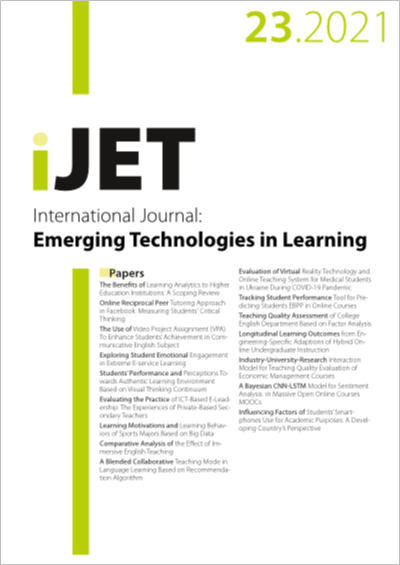Research on the Relationship between Learning Engagement and Learning Completion of Online Learning Students
DOI:
https://doi.org/10.3991/ijet.v17i01.28545Keywords:
online learning; student; learning input; learning completionAbstract
With the deep integration of the Internet and education, new educational models, such as micro classrooms, large-scale open online courses, and flipped classrooms have gradually appeared. In the information age, online learning has become popular in most countries all over the world, especially in the face of public crises such as the COVID-19 pandemic. Online learning can effectively connect teachers and students through the Internet. However, the low participation and low cognitive level of e-learning also affect the quality of e-learning, which depends largely on the learning investment of students. Based on self-efficacy theory and exploratory community theory, this paper puts forward the hypothesis that students’ e-learning investment affects learning completion and tests the mediating effect of incorporating self-efficacy into students’ e-learning investment on learning completion. The results show that the Cronbach’s α coefficient is 0.968, which has high reliability. KMO value is 0.880, indicating that data information can be extracted effectively. The three aspects of students’ e-learning input (behavioral investment, cognitive input, and emotional input) constructed in this paper can significantly improve the learning completion level of students. The results of this study have positive value for understanding the advantages and disadvantages of e-learning, promoting the reform of e-learning methods in universities, and implementing e-learning strategies for students familiar with different e-learning years.
Downloads
Published
How to Cite
Issue
Section
License
Copyright (c) 2021 Wenjing You

This work is licensed under a Creative Commons Attribution 4.0 International License.



